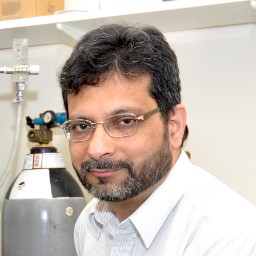Dr Shakeeb Moosavi
BSc, PhD, FHEA
Reader in Clinical Physiology
School of Biological and Medical Sciences

Role
After graduating in Physiology from King’s College London, I worked as research technician in child health at Leicester Royal Infirmary. In 1988 I became a clinical physiologist at Charing Cross Hospital and began a PhD studying exercise breathing. My first postdoctoral position (also at Charing Cross) involved neurophysiological research on severely brain-injured patients.
In 1998 I moved to Harvard to research mechanisms of breathlessness and returned in 2004 to a lectureship at Imperial College. In 2010 I spent a year as research scientist with UK Spinal Cord Injury Research Network at Stoke Mandeville Hospital.
I joined Oxford Brookes Universtity in 2011 as a Senior Lecturer and research group lead. I am also a Physiological Society Representative for Oxford Brookes University.
Areas of expertise
- Cardiorespiratory integration
- Respiratory control and sensation
- Dyspnoea (breathlessness) mechanisms, assessment, management
Teaching and supervision
Courses
- Biological Sciences (Human Biosciences) (BSc (Hons), MBiol)
- Biomedical Science (BSc (Hons))
- Medical Science (BSc (Hons))
Modules taught
- Scientific Skills (Level 4-single)-Tutor
- Professional and Experimental Skills (Level 4-single)-Tutor
- Human Structure and Function (Level 4-double)-Lectures
- Research Methods (Level 5-single)-Project coursework supervisor
- Integrated Physiology (Level 5-double) Lectures, practicals, PBL
- Pathophysiology (Level 6-double) Module Leader
- Neuroscience (Level 6-double) Module Leader
- Research Projects (Level 6-double) Supervisor
I fulfil the following roles:
- Academic Adviser (UG Levels 4-6)
- Research projects supervisor (UG Levels 5-6)
- Module Leader (UG levels 5-6)
- Director of Studies (Postgraduate)
Supervision
- Jan'21 -Dec'23 (Director of studies; Self-funded PhD)
Dr. Maria Yermolitska "Inhaled hydroxygas for dyspnoea relief" -(Active) - Sep'20 - Aug'23 (Director of studies; Groome Studentship)
Mr.Tom Chapman "Respiratory control and dysfunction in Parkinson's Disease" -(Active) - Sep’16 – Aug’19 (Director of Studies; Groome Studentship)
Ms. Charlotte Golding “Effects of neurosurgical intervention and neurological damage on dyspnoea“ - (Awarded August 2020)
(currently studying Medicine) - Jan’15 – Jan’21 (Director of Studies; part-time direct PhD)
Dr. Joanna Grogono “Mechanism of dyspnoea in heart failure” -(Awarded February 2021)
Now appointed as a Consultant in Cardiology - Oct’12 – Sep’16 (Director of Studies; Groome Studentship)
Dr. Emmanuel Debrah “Cerebral mechanisms of dyspnoea and its relief” -(Awarded March 2017)
Currently employed as a clinical trials coordinator in Neuroscience
Research
My primary research interest is to find out how breathlessness (‘dyspnoea’) arises so that more effective drugs can be developed to relieve dyspnoea when the underlying disease can’t be cured. The multidisciplinary research involves experiments on healthy volunteers and various patients who are inordinately breathless.
I have tested hypotheses regarding ‘air hunger’ (an unpleasant component of dyspnoea), validated ways to induce specific components of dyspnoea using specially-constructed breathing circuits and developed a unique questionnaire that quantifies overall breathlessness (intensity and unpleasantness) and is based on the language patients use to describe their experience. The work has guided on-going clinical studies including randomised-controlled trials to test novel interventions.
I have a three-pronged research strategy:
- To study patients undergoing neurological interventions or suffering neurological damage in order to better understand neurophysiological mechanisms of breathlessness.
- To use the improved understanding of neurophysiological mechanisms of breathlessness to identify and trial new pharmacological interventions for intractable breathlessness.
- To address emerging concerns in clinical physiology, particularly those that have the potential to stretch the NHS to breaking point.
Research impact
Mechanisms and management of breathlessness is at the core of the research strategy outlined below. There is an urgent clinical need for effective and safe interventions for breathlessness relief when underlying pathophysiology is incurable. This need has been amplified by the coronavirus pandemic.
Centres and institutes
Groups
Publications
Professional information
Memberships of professional bodies
- Physiological Society (Full member)
- The Dyspnea Society (Nominee for executive committee)
Conferences
- Dyspnea 2021 International Conference - Hosted at Oxford Brookes in July 2022
Further details
The Frontiers in Neuroscience jounal invited us to guest-edit a special collection of articles on Respiratory control and dysfunction in neurological patients. Please follow this link to submit your papers.
Other experience
- 1987-1988 Res Technician (Leicester Royal infirmary-Child Health)
- 1988-1994 Clinical Physiologist (Charing Cross Hospital, London)
- 1994-1998 PostDoc RA (Imperial College London-Neurophysiology)
- 1998-2003 Research Scientist (Harvard School of Public Health)
- 2004-2010 Lecturer (Imperial College London-NHLI)
- 2010-2011 Research Scientist (Stoke Mandeville Hospital-UKSCIRN)
Further information
